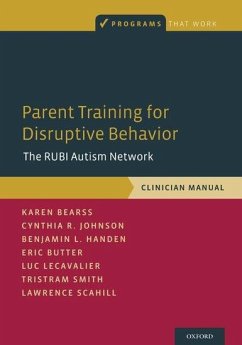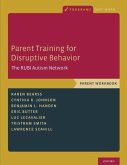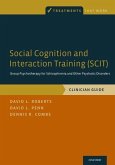Karen Bearss, Cynthia R Johnson, Benjamin L Handen, Eric Butter, Luc Lecavalier, Tristram Smith, Lawrence Scahill
Parent Training for Disruptive Behavior
The Rubi Autism Network, Clinician Manual
Karen Bearss, Cynthia R Johnson, Benjamin L Handen, Eric Butter, Luc Lecavalier, Tristram Smith, Lawrence Scahill
Parent Training for Disruptive Behavior
The Rubi Autism Network, Clinician Manual
- Broschiertes Buch
- Merkliste
- Auf die Merkliste
- Bewerten Bewerten
- Teilen
- Produkt teilen
- Produkterinnerung
- Produkterinnerung
This Therapist Guide, Parent Training for Disruptive Behavior, is designed for therapists to use with parents of children with ASD and challenging behaviors, such as tantrums, noncompliance, and aggression. Based on the principles of Applied Behavior Analysis and developed over more than a decade of research, the intervention consists of 11 core sessions as well as supplemental sessions, a home visit, and follow-up visits.
Andere Kunden interessierten sich auch für
![Parent Training for Disruptive Behavior Parent Training for Disruptive Behavior]() Karen BearssParent Training for Disruptive Behavior72,99 €
Karen BearssParent Training for Disruptive Behavior72,99 €![Social Cognition and Interaction Training (Scit) Social Cognition and Interaction Training (Scit)]() David L RobertsSocial Cognition and Interaction Training (Scit)102,99 €
David L RobertsSocial Cognition and Interaction Training (Scit)102,99 €![Oppositional, Defiant & Disruptive Children and Adolescents Oppositional, Defiant & Disruptive Children and Adolescents]() Scott WallsOppositional, Defiant & Disruptive Children and Adolescents21,99 €
Scott WallsOppositional, Defiant & Disruptive Children and Adolescents21,99 €![Healing After Parent Loss in Childhood and Adolescence Healing After Parent Loss in Childhood and Adolescence]() Healing After Parent Loss in Childhood and Adolescence47,99 €
Healing After Parent Loss in Childhood and Adolescence47,99 €![Negotiating Parent-Adolescent Conflict Negotiating Parent-Adolescent Conflict]() Arthur L RobinNegotiating Parent-Adolescent Conflict48,99 €
Arthur L RobinNegotiating Parent-Adolescent Conflict48,99 €![Disruptive Behavior Disorders in Children Disruptive Behavior Disorders in Children]() Meredith WeberDisruptive Behavior Disorders in Children42,99 €
Meredith WeberDisruptive Behavior Disorders in Children42,99 €![Interventions for Disruptive Behaviors Interventions for Disruptive Behaviors]() Gregory A FabianoInterventions for Disruptive Behaviors48,99 €
Gregory A FabianoInterventions for Disruptive Behaviors48,99 €-
-
-
This Therapist Guide, Parent Training for Disruptive Behavior, is designed for therapists to use with parents of children with ASD and challenging behaviors, such as tantrums, noncompliance, and aggression. Based on the principles of Applied Behavior Analysis and developed over more than a decade of research, the intervention consists of 11 core sessions as well as supplemental sessions, a home visit, and follow-up visits.
Hinweis: Dieser Artikel kann nur an eine deutsche Lieferadresse ausgeliefert werden.
Hinweis: Dieser Artikel kann nur an eine deutsche Lieferadresse ausgeliefert werden.
Produktdetails
- Produktdetails
- Verlag: Hurst & Co.
- Seitenzahl: 248
- Erscheinungstermin: 28. August 2018
- Englisch
- Abmessung: 250mm x 174mm x 16mm
- Gewicht: 526g
- ISBN-13: 9780190627812
- ISBN-10: 0190627816
- Artikelnr.: 52962163
- Herstellerkennzeichnung
- Produktsicherheitsverantwortliche/r
- Europaallee 1
- 36244 Bad Hersfeld
- gpsr@libri.de
- Verlag: Hurst & Co.
- Seitenzahl: 248
- Erscheinungstermin: 28. August 2018
- Englisch
- Abmessung: 250mm x 174mm x 16mm
- Gewicht: 526g
- ISBN-13: 9780190627812
- ISBN-10: 0190627816
- Artikelnr.: 52962163
- Herstellerkennzeichnung
- Produktsicherheitsverantwortliche/r
- Europaallee 1
- 36244 Bad Hersfeld
- gpsr@libri.de
Karen Bearss, PhD is Assistant Professor in the Department of Psychiatry and Behavioral Sciences at the University of Washington. Dr. Bearss specializes in the assessment and treatment of individuals with Autism Spectrum Disorder (ASD) and their families. Her current research focus is in developing, implementing, and evaluating evidence-based parenting interventions for children with Autism Spectrum Disorders (ASD). She is also invested in designing strategies for improving the dissemination and implementation of evidence-based treatments into the community. Cynthia R. Johnson, PhD is the Director of the Cleveland Clinic Center for Autism and faculty of the Lerner College of Medicine, Case Western Reserve University. She is currently the principal investigator of a NIH-funded grant studying the efficacy of parent training in the treatment of feeding problems. She has had prior NIH funding on the efficacy of parent training in the treatment of disruptive behaviors in young children with Autism Spectrum Disorder and the treatment of sleep disturbances. Dr. Johnson is a licensed psychologist and a board-certified behavior analyst- doctoral level. Benjamin Handen, PhD is Professor of Psychiatry and Pediatrics at the University of Pittsburgh School of Medicine and principal investigator of the University of Pittsburgh Autism Treatment Network (ATN). Over the past 30 years, Dr. Handen has led a number of federally-funded and foundation-funded studies involving both children and adults with autism spectrum disorder. His research has focused on both pharmacological and psychosocial interventions. He is a licensed psychologist and board-certified behavior analyst-doctoral level. Eric M. Butter, PhD is an Associate Professor of Pediatrics and Psychology at the Ohio State University and Chief of Pediatric Psychology and Neuropsychology at Nationwide Children's Hospital in Columbus, Ohio, where is also the Director of the Child Development Center. Dr. Butter is a Clinical Psychologist with specialization in autism spectrum disorder and other neurodevelopmental disabilities and his research has focused on the bio-medical correlates, potential etiologies and treatment of these disorders. Luc Lecavalier, PhD, is a Professor of Psychology and Psychiatry at The Ohio State University. He is a clinical psychologist who is interested in the assessment and treatment of individuals with autism spectrum disorder and other neurodevelopmental disabilities. He has authored or co-authored more than 100 publications on the topic. Tristram Smith, PhD, is the Haggerty-Friedman Professor University of Rochester Medical Center (URMC), where he leads federally funded studies comparing the efficacy of different interventions for children with autism spectrum disorder. He is also a clinician in URMC's Community Consultation Program, serving students with ASD and other intellectual disabilities in schools and other agencies. Lawrence Scahill, MSN, PhD, is Professor of Pediatrics at Emory University School of Medicine and Director of Clinical Trials at the Marcus Autism Center. He has played a central role in the Research Units on Pediatric Psychopharmacology (RUPP) Autism Network and the Research Units on Behavioral Intervention (RUBI).
* CONTENTS
* Acknowledgments
* Introduction to the Manual
* Introduction to the Behavior Support Plan
* Core Sessions
* Session 1: Behavioral Principles
* Session 2: Prevention Strategies
* Session 3: Daily Schedules
* Session 4: Reinforcement 1
* Session 5: Reinforcement 2
* Session 6: Planned Ignoring
* Session 7: Compliance Training
* Session 8: Functional Communication Training
* Session 9: Teaching Skills 1
* Session 10: Teaching Skills 2
* Session 11: Generalization and Maintenance
* Appendix A Telephone Booster
* Appendix B Home Visit
* Appendix C Parent Training Case Example with Sample Behavior Support
Plan
* Appendix D Problem-Solving Common Challenges in Implementing the
Program
* Appendix E RUBI Progress Note
* References
* About the Authors
* Acknowledgments
* Introduction to the Manual
* Introduction to the Behavior Support Plan
* Core Sessions
* Session 1: Behavioral Principles
* Session 2: Prevention Strategies
* Session 3: Daily Schedules
* Session 4: Reinforcement 1
* Session 5: Reinforcement 2
* Session 6: Planned Ignoring
* Session 7: Compliance Training
* Session 8: Functional Communication Training
* Session 9: Teaching Skills 1
* Session 10: Teaching Skills 2
* Session 11: Generalization and Maintenance
* Appendix A Telephone Booster
* Appendix B Home Visit
* Appendix C Parent Training Case Example with Sample Behavior Support
Plan
* Appendix D Problem-Solving Common Challenges in Implementing the
Program
* Appendix E RUBI Progress Note
* References
* About the Authors
* CONTENTS
* Acknowledgments
* Introduction to the Manual
* Introduction to the Behavior Support Plan
* Core Sessions
* Session 1: Behavioral Principles
* Session 2: Prevention Strategies
* Session 3: Daily Schedules
* Session 4: Reinforcement 1
* Session 5: Reinforcement 2
* Session 6: Planned Ignoring
* Session 7: Compliance Training
* Session 8: Functional Communication Training
* Session 9: Teaching Skills 1
* Session 10: Teaching Skills 2
* Session 11: Generalization and Maintenance
* Appendix A Telephone Booster
* Appendix B Home Visit
* Appendix C Parent Training Case Example with Sample Behavior Support
Plan
* Appendix D Problem-Solving Common Challenges in Implementing the
Program
* Appendix E RUBI Progress Note
* References
* About the Authors
* Acknowledgments
* Introduction to the Manual
* Introduction to the Behavior Support Plan
* Core Sessions
* Session 1: Behavioral Principles
* Session 2: Prevention Strategies
* Session 3: Daily Schedules
* Session 4: Reinforcement 1
* Session 5: Reinforcement 2
* Session 6: Planned Ignoring
* Session 7: Compliance Training
* Session 8: Functional Communication Training
* Session 9: Teaching Skills 1
* Session 10: Teaching Skills 2
* Session 11: Generalization and Maintenance
* Appendix A Telephone Booster
* Appendix B Home Visit
* Appendix C Parent Training Case Example with Sample Behavior Support
Plan
* Appendix D Problem-Solving Common Challenges in Implementing the
Program
* Appendix E RUBI Progress Note
* References
* About the Authors








